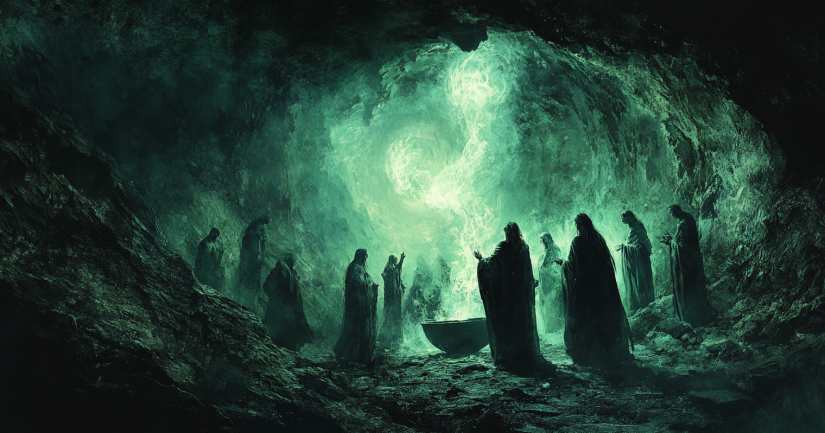
Delve into the eerie prophecies and rising chaos with the Macbeth Act 4 Quiz, exploring Shakespeare’s world. Here, you will journey through the dark corridors of power, ambition, and fate. As the witches brew their enigmatic potions, Macbeth grapples with haunting visions and ominous prophecies. This quiz invites you to unravel the complexities of Act 4, where the future of Scotland hangs in a delicate balance.
You will delve into Macbeth’s psyche, exploring his descent into madness and the chilling consequences of his unchecked ambition. Each question will test your understanding of the intricate plot twists and the profound themes Shakespeare weaves into this act. Discover the pivotal moments that shape Macbeth’s destiny and the fates of those around him.
As you navigate this quiz, you’ll gain insights into Shakespeare’s masterful use of language and symbolism. You’ll sharpen your analytical skills by deciphering character motivations and the play’s moral undercurrents. So, prepare your mind and immerse yourself in this thrilling exploration of Macbeth Act 4. Every answer brings you closer to unlocking the mysteries of one of literature’s greatest tragedies.
Macbeth Quizzes – Can you handle the blood and betrayal?
The witches’ prophecies take a dark turn, and Macbeth’s downfall looms. But before his fate is sealed, see how the tragedy unfolds in our Macbeth Act 5 Quiz. Want to trace his descent into madness? Revisit Macbeth Act 3 Quiz to see how paranoia set in. Or, if you’re ready for the ultimate challenge, test your knowledge of the entire play with our Macbeth Full Book Quiz.
What Happened – Macbeth Act 4
In Act 4 of Macbeth, several key events occur. The act begins with the three witches meeting again. They prepare a potion in a cauldron. Macbeth visits them to learn more about his future. The witches show him three apparitions. The first apparition is an armored head, which warns him to beware of Macduff. The second is a bloody child, telling him that no one born of a woman will harm him. The third is a crowned child holding a tree, saying he will not be defeated until Birnam Wood moves to Dunsinane Hill.
After the apparitions, Macbeth demands to know if Banquo’s descendants will rule Scotland. The witches show him a vision of eight kings, all resembling Banquo, suggesting his lineage will continue. Macbeth is upset by this vision.
Meanwhile, in England, Macduff seeks help from Malcolm, King Duncan’s son, to overthrow Macbeth. Malcolm tests Macduff’s loyalty. He eventually trusts him and agrees to join forces. Ross arrives and informs Macduff that Macbeth has killed his family. Macduff is heartbroken, and he vows revenge against Macbeth.
Back in Scotland, Lady Macduff and her children are attacked by Macbeth’s men. They are brutally murdered. This act of violence increases the tension and sets the stage for the upcoming conflict. The act ends with both sides preparing for the battle that will determine the future of Scotland.
Macbeth Act 4 – Quotes
- “Double, double toil and trouble; Fire burn, and cauldron bubble.” – Witches, ‘Chanting a spell as they prepare a potion, foreshadowing chaos in Scotland.’
“Something wicked this way comes.” – Second Witch, ‘Referring to Macbeth as he approaches the witches for more prophecies.’
“By the pricking of my thumbs, something wicked this way comes.” – Second Witch, ‘Sensing the arrival of Macbeth, who has become evil.’
“Macbeth shall never vanquished be until Great Birnam Wood to high Dunsinane Hill shall come against him.” – Third Apparition, ‘Prophecy given to Macbeth, making him overconfident about his invincibility.’
“The very firstlings of my heart shall be the firstlings of my hand.” – Macbeth, ‘Deciding to act on his instincts without hesitation after hearing the apparitions’ prophecies.’
“Yet who would have thought the old man to have had so much blood in him?” – Lady Macbeth, ‘Sleepwalking and revealing her guilt over the murder of King Duncan.’
“Out, damned spot! out, I say!” – Lady Macbeth, ‘Desperately trying to wash away imaginary bloodstains, symbolizing her overwhelming guilt.’
“The power of man, for none of woman born shall harm Macbeth.” – Second Apparition, ‘Misleading Macbeth into believing he is invincible, which affects his actions.’
“Macbeth is ripe for shaking, and the powers above put on their instruments.” – Malcolm, ‘Planning to overthrow Macbeth with divine support.’
Macbeth Act 4 – FAQ
Act 4 centers on ambition, deception, and fate. Macbeth consults the witches, receiving new prophecies that fuel his ambition and lead to more atrocities as he tries to secure his power. The act highlights how unchecked ambition can destroy and shows the consequences of trying to control fate.
The witches’ prophecies deeply affect Macbeth, making him paranoid and eager to secure his throne. They warn him to beware of Macduff, suggest no man born of a woman can harm him, and say he won’t fall until Birnam Wood comes to Dunsinane. These messages embolden him, prompting the murder of Macduff’s family and reinforcing his tyrannical rule.
Lady Macduff contrasts sharply with Lady Macbeth. In her brief scene, she laments her husband’s absence and questions his loyalty, highlighting betrayal and the personal toll of Macbeth’s ambition. Her and her children’s murder exemplifies the senseless violence unleashed by Macbeth’s reign.
Act 4 foreshadows Macbeth’s downfall through prophecy and overconfidence. The witches’ predictions give him false security, making him feel invincible. However, their misleading nature sets the stage for his defeat, hinting at the collapse of his power and the coming retribution.
The apparitions reveal Macbeth’s fate while deepening his delusions. Each message seems to assure his invincibility but is ambiguous. This illustrates how relying on supernatural guidance leads Macbeth to misinterpret his destiny, driving the tragic events that follow.
